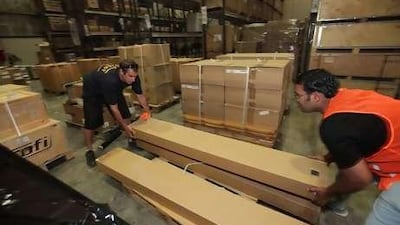DUBAI // While aid workers in Pakistan scramble to help the millions of people in need, the pressure is on Dubai-based UN staff to get vital relief equipment to them quickly. Staff at the United Nations' Humanitarian Response Depot (UNHRD) have been working round the clock since the floods began to ensure that relief items they store for their 38 partner organisations - including tents, pre-fabricated buildings and medical supplies - arrive within 24 to 48 hours of request at airports in Karachi and Islamabad.
"Whenever there is an emergency we receive a call from our partners and arrange the transportation of goods," explained John Kisanara, UNHRD's Dubai hub manager. "Later, we may also send staff to carry out an assessment and, on request, help construct the pre-fab buildings which may be used as offices or accommodation for aid workers, or storage facilities." Dubai's geographical positioning means that the UNHRD base here has taken a commanding logistical role in managing aid efforts.
Within hours of the floods in Pakistan, Mr Kisanara received a call from Qatari officials offering the use of aircraft to deliver aid. "I immediately called our users to inform them there was an aircraft available, offering free delivery of emergency items for whoever wants to use it," Mr Kisanara said. "Those interested then let me know what they wanted so that we could prepare them to be sent." The 12-strong UNHRD Dubai team, which was on stand-by that weekend, sprung into action immediately, sorting goods before getting them to the airport.
Soon after that first call, another came from the British military, offering an aeroplane that could transport 45 tonnes of aid. Partners including Islamic Relief, the Qatar Charity and the World Health Organisation were all contacted and aid was arranged for dispatch on the British aircraft. Between August 7 and August 14, just under 100 tonnes of supplies, such as canned mutton, medical equipment, water stations and high-energy biscuits, left the UNHRD in Dubai, bound for Pakistan.
Among aid sent was tonnes of IT and telecommunications equipment for the Dubai-based UN World Food Programme's Fast Information Technology and Telecommunications Emergency and Support Team (Fittest), which was among the first emergency teams on the ground. The squad of three, led by veteran telecoms specialist Dane Novarlic, are tasked with ensuring all humanitarian aid workers, regardless of which agency they are associated with, can communicate with each other and their head offices.
"If aid workers cannot exchange information, they cannot organise rescue missions, food distributions or medical care," explained Mr Novarlic. Fittest's first task on landing in Pakistan was to meet with local IT staff and gain an understanding of what was needed of them for the humanitarian effort. "Because of the size of the disaster and the number of people affected, providing services for that many people is definitely a challenge," he said.
Meanwhile, back at Fittest's headquarters, in Dubai's International Humanitarian City, several of Mr Novarlic's colleagues have just returned from missions in Afghanistan, Niger and Sudan. Many are married, including Ekue Ayih, who has been with Fittest for two years and has just returned from a four-month mission in drought-stricken Niger. Despite spending months away from their families while working in dangerous and often hostile conditions, sometimes with no access to running water or a bed, none complain.
"It is rewarding and satisfying. It doesn't compare to anything I have ever done before," said Rob Buurveld, 39, from Holland, who has worked in Haiti and Afghanistan this year. "We don't give the food to people, but at least we help the people who give the food, and that is the part I like. "When I arrived in Banda Aceh following the tsunami [in 2005], the driver told me he had lost his whole family - everybody had gone: his wife, children, his parents, sisters, brothers. But he said to me, 'You guys are here now; things are being built and things will improve'. When you hear that you don't want to do anything else."
@Email:loatway@thenational.ae

